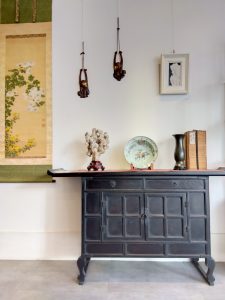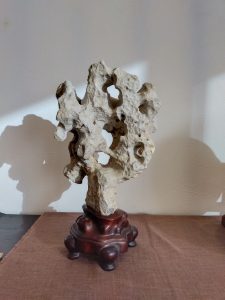今年の漢字は「税」でしたね(愛知県名古屋市千種区姫池通 骨董買取 古美術風光舎)
2023.12.12
みなさまこんにちは、スタッフTでございます。

さて、本日12月12日は「いい字 いち字」の語呂合わせで「漢字の日」。1995年から始まり、今年で29回目を迎えます。
日本漢字能力検定協会がその年をイメージする漢字一字の公募を日本全国より行い、その中で最も応募数の多かった漢字一字を、その年の世相を表す漢字として、京都・清水寺で発表する「今年の漢字」。
清水寺の森清範貫主により、巨大な和紙に漢字一字が揮毫(きごう)され、その後一年の出来事を清めるとともに新年が明るい年になることを願い、本堂で一般公開されたのち、本尊の千手観世音菩薩に奉納されます。
年末の風物詩ですので、私も毎年あれやこれやと、どんな漢字になるのか予想しながら楽しみにしておりますが、それ以上に楽しみなのが、森清範貫主が縦約1.5メートル、横約1.3メートルの和紙に書かれる迫力ある大書です。
森清範貫主は1995年以来、すべての漢字を書かれています。そして「今年の漢字」の発表時に書く漢字、なんと事前に知らされることはなく、発表当日の朝に中身の見えないように封筒に入れられ、手渡されるそうです。つまり、練習することなく、ぶっつけ本番で書かれているのだそうです。
私、少々書道をかじっておりましたが、あんな大きな紙に一発で清書するなんて、恐ろしくてできません。ましてや、多くの観客や報道陣の前ですので、きっと、ものすごい緊張感でしょう。ですので、漢字そのものより、森貫主の書かれる書の方が楽しみかもしれません。
そして揮毫(きごう)の瞬間のテレビ中継もおなじみですが、 その発表の20~30分前から、森貫主に手渡す筆に墨を念入りに含ませる男性をご存知ですか? 人呼んで「墨爺(すみじい)」。 この男性は「今年の漢字」の生みの親ともいえる方なのだそうですよ。
あの大書に使われている筆は、広島県熊野産の牛耳兼毫筆(ぎゅうじけんごうふで)。毛は白天尾(しろあまお)で長さ11.5cm 直径4.5cm、軸の長さ26cm(一番太いところの直径は約5.5cm)。奈良県産の墨を使用し、黒谷和紙協同組合の講師による指導のもと、京都伝統工芸大学校の学生たちが手漉きをした和紙に書かれています。
書道における墨継ぎ(筆に含ませた墨が足りなくなった時、更に墨を含ませて書き続けること)はとても大切で、筆の素材、軸の大きさ、鋒の長さ、紙の厚み、紙の素材、墨の種類などでにじみ・かすれが変わってきます。根元までしっかりと墨を含ませた筆で、一気に書き上げられる今年の漢字の揮毫の様子はついつい見入ってしまいます。
そして、この「今年の漢字」は、京都にある漢字ミュージアムで見られるそうです。
開始当初の1995年から2020年までの大書現物をすべて展示しており、大書はもちろんのこと、漢字に合わせた額縁デザインや、大書の揮毫時に使用されたものと同じ「筆」と「墨入れ」が見られるのも見どころの一つだそうですよ。
ではでは、また。

Hello everyone, this is Staff T.
Today, December 12, is the 29th Kanji Day, which started in 1995.
The Japan Kanji Aptitude Testing Foundation holds a nationwide contest to select the kanji that best represents the year, and the kanji with the highest number of entries is announced at Kiyomizu-dera Temple in Kyoto as the kanji that represents the year’s current state of affairs.
The kanji is written on a huge piece of Japanese paper by Kiyomizu-dera’s chief priest, Seinori Mori, and then displayed in the main hall of the temple to purify the year’s events and to wish for a happy new year.
As it is a tradition at the end of the year, I also look forward to seeing what kanji characters will be written each year, but what I look forward to even more is the powerful calligraphy that Seinori Mori writes on a 1.5 meter long and 1.3 meter wide sheet of Japanese paper.
Since 1995, Seinan Mori has written every Kanji character in the world. The kanji to be written for this year’s “Kanji of the Year” are not announced in advance, but rather are placed in an envelope on the morning of the announcement, with the contents hidden from view, and handed to the participants. In other words, the kanji are written on the spot, without any practice.
I have a bit of experience in calligraphy, but I would never have been able to write on such a large piece of paper in a single stroke. And I am sure it must have been extremely nerve-wracking in front of so many spectators and reporters. Therefore, I am probably more looking forward to the calligraphy than the kanji themselves.
The TV broadcast of the moment of writing the calligraphy is well-known, but do you know the man who, 20 to 30 minutes before the announcement, carefully pours ink into the brush that will be handed to Mori Kancho? He is called “Sumijii. This man can be said to be the creator of this year’s Kanji characters.
The brush used to write the large brush is a Gyujikengo-fude brush made in Kumano, Hiroshima Prefecture. The hair is white amao, 11.5 cm long, 4.5 cm in diameter, and the shaft is 26 cm long (the diameter at the thickest point is about 5.5 cm). It is written on Japanese paper handmade by students of the Kyoto College of Traditional Crafts under the guidance of instructors from the Kurotani Washi Cooperative Association, using ink produced in Nara Prefecture.
In calligraphy, ink transfer (when the ink in the brush runs out, the artist must add more ink and continue writing) is very important. It is very interesting to watch the process of writing this year’s Kanji characters with a brush that has been dipped in ink all the way down to the base of the brush.
The “This Year’s Kanji” can be seen at the Kanji Museum in Kyoto.
One of the highlights of the museum is not only the large brush strokes but also the frames designed to match the kanji, and the same “brush” and “ink container” that were used when the strokes were written.
See you soon.
*******************
ご実家の整理やお片付けなどをされている方のご相談などが多くございます。
お片付けなどくれぐれもご無理のないようになさってくださいませ。
風光舎では古美術品や骨董品の他にも絵画や宝石、趣味のお品など様々なジャンルのものを買受しております。
お片付けをされていて、こういうものでもいいのかしらと迷われているものでも、どうぞお気軽にご相談下さいませ。
また風光舎は、出張買取も強化しております。ご近所はもちろん、愛知県内、岐阜県、三重県その他の県へも出張いたします。
まずは、お電話お待ちしております。
愛知県名古屋市千種区姫池通
骨董 買取
【古美術 風光舎 名古屋店】
TEL052(734)8444
10:00-18:00 OPEN
#出張買取#骨董#古美術#骨董品#絵画#版画#茶道具#刀剣#彫刻

